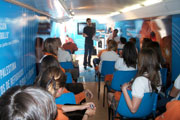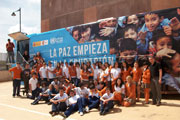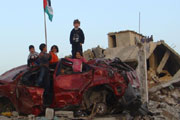FEATURE: From Gaza to Guadarrama – UN spreads the word on Palestinian refugees

But that distance edged a little closer recently, with a special project aimed at providing a glimpse into the lives of nearly five million refugees assisted by the United Nations Relief and Works Agency for Palestine Refugees in the Near East (UNRWA).
A bus converted into mobile classroom, with large signs emblazoned with the words “Peace Starts with Education,” has been stopping in central and northern Spain, with the aim – organized by the UNRWA Spanish Committee – of supporting the work of UNRWA and informing the Spanish public about the situation faced by those refugees.

High school students taking part in in a workshop onboard the UNWRA Spanish Committee's mobile classroom
More than 850 high school students attended special workshops on the bus in May, focusing on the situation of Palestinian refugees as a case study for human rights. The bus was open for students in the mornings, while afternoons were reserved for the public.
“One of the most frequent-asked questions from students who come to the classroom bus is ‘why after all this time, a peaceful solution has not been possible for this situation’?” said Carlos Hernandez, the UNRWA Spanish Committee’s education officer and one of the teachers on board the bus.

Members of the UNRWA Spanish Committee and high school students gather outside the mobile classroom
“I learned about the incredible number of Palestinian refugees; I was really shocked when I heard that number,” said one high school student in Guadarrama, a town near Madrid. “That’s kind of amazing how people don’t care much about those numbers before they hear them; the numbers changed my way of thinking and I want to help.”
“I thought there were baddies and goodies; I thought that Israel was the bad guys and West Bank and Gaza were the goodies; and after I came to the bus, I knew that there are no goodies and baddies, just two countries fighting each other and they have to end this war,” said another high school student in Guadarrama.
As the UN agency charged with the assistance, protection and advocacy for some 4.8 million registered Palestinian refugees in Jordan, Lebanon, Syria and the occupied Palestinian territory, pending a solution to their plight, UNRWA is the main provider of basic services such as education, health care, relief and social services.
“This is a brilliant initiative which highlights to grass-roots audiences in Spain the value of UNRWA’s human development work, particularly in education. And it also informs new audiences about UNRWA, which is not well known or understood,” said Chris Gunness, the agency’s spokesperson.

Palestinian children play amongst ruins in Gaza (file photo).
The educational tour is part of a wider project, ‘Solidarity in the classroom,’ created in 2008 by UNRWA’s Spanish Committee in partnership with Spain’s Agency of Cooperation for Development. The project encourages children and young people to compare different realities, emphasizing human rights, respect and coexistence both inside and outside the Spanish classroom.
The UNRWA Spanish Committee hopes to have the mobile classroom back on the road in the next school year.
